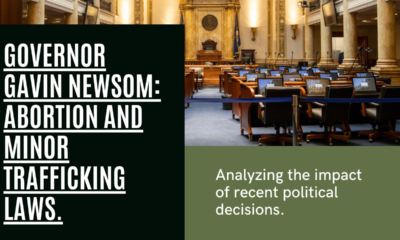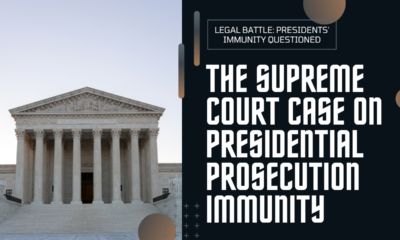Constitution
Obamacare roadblock in appeals court

The Obamacare bill ran into another judicial roadblock yesterday. The Eighth Circuit Court of Appeals enjoined federal officials from telling a private business to cover “birth control,” including pills, devices, and even surgery. The business sued on religious-freedom grounds. But the real winning evidence against Obamacare this time might have been medical, not philosophical or libertarian.
The Obamacare case
The latest case, O’Brien v. HHS, Sebelius, et al., involves the owner of a group of companies that mine and process ceramic and other heat-resistant materials. At issue is not the core business of O’Brien Industrial Holdings, but the religious faith of the owner, Frank R. O’Brien. He follows the Roman Catholic faith. And today the Roman Catholic Church teaches that abortion is wrong. For Mr. O’Brien and his wife not to get an abortion is not enough. If he, a boss, gives those who work for him this “benefit,” he commits murder by proxy. (In Psalm 139:13-16, King David of Israel acknowledged that God knew him before he was born, while his mother was carrying him. King David’s message is clear: abortion is murder.)

The Star of Life, featuring the Rod of Asclepius, the true symbol of medicine. Photo: US Department of Transportation
The problem: some of the drugs that the Food and Drug Administration has approved to stop new babies from forming, can also kill them after they have formed. The fancy Latin word for this is abortifacient, or something that makes an abortion happen. In his complaint, O’Brien talks specifically about the “morning-after pill,” “Plan B,” and “Ella,” to name three. Obamacare seems to say: if you run a business, you shall pay for pills like these. O’Brien has a problem: obey the government, or obey God. He can’t do both. Not in this case.
In October, a district court in Missouri dismissed O’Brien’s case. O’Brien, with the American Center for Law and Justice to help him, appealed. Yesterday a three-judge panel of the Eighth Circuit Court not only sent the case back to the trial court, but also moved to stop federal officials from forcing O’Brien’s business to “cover” these medicines and other measures for those who work for them.
No other appeals court has done anything like this, as the ACLJ said. For the ACLJ the issue is simple:
Employers like Frank O’Brien must be able to [run] their business in a manner consistent with their moral values, not the values of the government.
And what are the values of this government? They seem to be the values of Sandra Fluke, since putative President Barack Obama still parades her out every chance he gets. She famously said she couldn’t afford nine bucks a month for birth control pills out of the salary of a “public interest lawyer.” Not long after she first said that, the Obamacare “Contraceptive Mandate” went into force.
David French, writing at National Review On-line, reminds us that courts normally don’t enjoin defendants or respondents this way unless the plaintiffs or appellants are more than likely to win. Naturally the ACLJ takes heart. In fact they have two other direct challenges to Obamacare moving through the courts today.
The medical argument
Tad Cronn at Godfather Politics, and Bob Unruh at WND, mentioned another reason the Eighth Circuit might have done what they did. The Bioethics Defense Fund and Life Legal Defense Foundation filed their own brief as “friends of the court.” They said Obamacare breaks the Administrative Procedures Act. That Act says in part:
An agency rule would be arbitrary and capricious if the agency has relied on factors which Congress has not intended it to consider, entirely failed to consider an important aspect of the problem, offered an explanation for its decision that runs counter to the evidence before the agency, or is so implausible that it could not be ascribed to a difference in view or the product of agency expertise.
The problem: those drugs that stop a new baby from forming, or kill one that has already formed, are just as dangerous to the woman who takes them. They can make her more likely to have a heart attack or a stroke. They can make the blood clot in the deep veins in the leg. Any patient with a clot in that place might throw that clot, or part of it, straight to the lungs. Women who take those drugs also are more likely to come down with cancers of the breast or cervix. The pills either throw their hormones out of whack or encourage them to do other things that make cervical cancer more likely. (Did anyone ever tell Sandra Fluke, for instance, that cervical cancer is a sexually transmitted disease?)
But that’s a key problem with Obamacare. It “covers” a “one size fits all” medicine. Even most conventional professors of medicine don’t think one set of treatments fits all patients, or even all patients with the same disease or syndrome. (And those who do alternative medicine make that point even more forcefully.) The Bioethics brief makes this point: the Obamacare contraceptive mandate doesn’t do the Sandra Flukes of the country any favors. So how is this not an “arbitrary and capricious” rule?
What happens next?
The ACLJ knows the court gave them only more time to argue Frank O’Brien’s case against Obamacare. Now, at least, they can argue it. But the real reason might be that the Bioethics Fund told the court that giving women these drugs would do them more harm than good. (Medical professors at least pretend to teach their students, first of all, to do no harm!) The Eighth Circuit told the trial court to look into those harms, and into Mr. O’Brien’s freedom to run his business as the Bible says. Even if you don’t believe in the Bible, you should believe he should run his business as he wants to, with the voluntary consent of those who work for him and buy his products.
[subscribe2]
Terry A. Hurlbut has been a student of politics, philosophy, and science for more than 35 years. He is a graduate of Yale College and has served as a physician-level laboratory administrator in a 250-bed community hospital. He also is a serious student of the Bible, is conversant in its two primary original languages, and has followed the creation-science movement closely since 1993.
-

 Education3 days ago
Education3 days ago‘Grading for Equity’: Promoting Students by Banning Grades of Zero and Leaving No Class Cut-Ups Behind
-

 Civilization5 days ago
Civilization5 days agoEarth Day Should Celebrate U.S. Progress & Innovation
-

 Family2 days ago
Family2 days agoIdaho defends against abortion mandate
-

 Civilization3 days ago
Civilization3 days agoNewsom plays silly abortion politics
-

 Education5 days ago
Education5 days agoThe Intifada Comes to America. Now What?
-

 Constitution1 day ago
Constitution1 day agoPresidential immunity question goes to SCOTUS
-

 Civilization4 days ago
Civilization4 days agoEarth Day – part of cultural Marxism
-

 Civilization4 days ago
Civilization4 days agoWaste of the Day: China Still Owes Over $1 Trillion to American Bondholders











Michael Alan Kline Sr liked this on Facebook.
Theresa Brooks liked this on Facebook.
My insurance covers lots of drugs which would be dangerous to me if I took them.
All medications carry risks, the class of drugs in question are in no way unique in that respect. The fact they are certified by the FDA indicates that the medical field in the US believes that the risks of these have been determined and that doctors should be aware of them. This is why one only takes medication under a doctor’s supervision. In what way is dictating insurance coverage dictating a one-size-fits-all treatment of patients by their doctors? How is the “medical argument” limited to these drugs and not applicable to all RX drugs?
You assume without warrant that I would not so apply that medical argument. I question the wisdom and safety of about ninety percent of the National Formulary, and the United States Pharmacopoeia, today.
Fly More Flags liked this on Facebook.